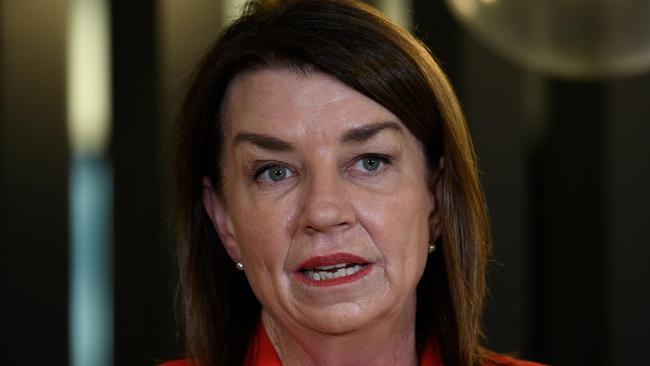New banking code drops responsible lending but expands small business protections
The ABA has sent a new banking code of conduct to ASIC for approval, adding protections for 10,000 small businesses while dropping responsible lending commitments.

Business
Don't miss out on the headlines from Business. Followed categories will be added to My News.
The Australian Banking Association has tabled a new code of practice with the corporate regulator, expanding protections for more small businesses – years after the Hayne royal commission first proposed that change – as well as new definitions for vulnerable customers and protections for loan guarantors.
The code sets minimum standards for helping customers who are experiencing financial difficulty and will add a definition of “vulnerable customers” that recognises anyone can experience serious financial difficulties “at any time in their life” due to the loss of a family member, job, or due to sickness, the banking group said.
Ironically, ABA chair Peter King’s Westpac, of which he is chief executive, faces a new lawsuit for allegedly failing to respond to vulnerable customers’ hardship notices, as financial stress rises due to higher interest rates and cost-of-living pressures.
The banking code of practice is a set of rules that banks must follow when dealing with their customers, and is enforced by the Australian Financial Complaints Authority. Courts have considered it to be a contractual agreement between banks and their customers.

The rights set in the code are meant to be “over and above the law” and give “customers significant extra safeguards,” ABA chief executive Anna Bligh said.
The new code – submitted with the corporate regulator on Friday – takes out responsible lending commitments that Ms Bligh says “merely restated current law”. It also excludes commitments to protect customers’ privacy, as that is covered by the Privacy Act.
“Having that in the code is no extra protection,” Ms Bligh said. “The law is the law and restating it in a code does nothing other than add a reporting burden, add to confusion from customers about: where does the right exist in the code or in law,” she said.
The code, as proposed, adopts close to two thirds of the more than 100 demands made by consumer groups in 2021, when the banking group had the code reviewed by Mike Callaghan, a former senior Treasury official, she said.
The Australian was not able to view the new code, which is self regulated by the industry and overseen by the Banking Code Compliance Committee (BCCC).
Consumer groups which had seen the updated code, however, said they were disappointed about the “much more” limited oversight role the BCC will have around the banks’ consumer lending practices.
Consumer groups had asked for stronger protections for loan guarantors and applying responsible lending obligations to buy now, pay later products issued by banks.
“We have included some protections – we’ve added in that we would exercise the care and skill of a diligent and prudent banker, in relation to the buy now, pay later products that are offered,” Ms Bligh said.
More detailed protections were left out because the federal government has already said the BNPL industry will be treated as credit. Adding specific measures in the banking code could therefore be potentially redundant or contrary with upcoming legislation, she said.
The number of small businesses which will be protected under the new code – including simplified loan documentation and limits on enforcement action – will increase to those with total debts of less than $5m, up from $3m currently.

The change gives protection to an additional 10,000 small business customers and was a key Hayne royal commission recommendation in 2019. The banking industry had resisted it, arguing the $3m threshold already covered 97 per cent of business loans and that increasing it could jeopardise their willingness to lend.
Following a review of the 2019 code by advisory firm Pottinger – which also recommended the change – the ABA finally said it would agree to expand the definition and would implement it by early 2023. It now expects implementation in the first half of 2024.
The Council of Small Business Organisations Australia welcomed the new protections saying they would improve and protect businesses’ ability to access finance.
“We know that access to finance remains a critical link for the success of small business, particularly in challenging economic circumstances,” COSBOA chief executive Luke Achterstraat said.
“There are over 2.5 million small businesses in Australia – the backbone of the economy – so it is time we backed them further in practical ways”
The updated code includes new obligations for banks to meet with customers who intend to act as guarantors, to provide a clearer definition of a vulnerable customer, and to organise or refer customers to free support services, Ms Bligh said.
The code will be clearer about the types of support that are available to all customers, including financial difficulty options for small businesses, and will include a section recognising banks need to be more inclusive and accessible to people with diverse sexual orientations and gender identities.
The Consumer Action Law Centre said the proposed updated code had “a few improvements” but it was not an “overall improvement in consumer protections”.
“Many of our asks from 2021 were not picked up in substance,” the consumer group’s chief executive, Stephanie Tonkin, said.
“The most obvious outcome of the code rewrite has been reducing banks’ reporting obligations, rather than improving consumer protections,” she said.
“Under the new Code, the BCCC oversight of consumer lending practices is much more limited. We think this is a mistake, particularly considering Code breaches regarding lending were the third most common breach type reported to the BCCC in 2022.”
The group said a new commitment to making interpreters available for culturally and linguistically diverse customers free of charge, where possible, would be a “most valuable improvement”.
In a statement ASIC said it would “undertake its own consultation with relevant industry stakeholders” before approving the code.
Originally published as New banking code drops responsible lending but expands small business protections



